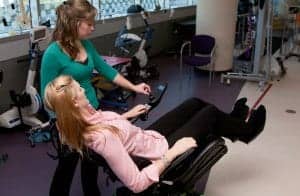According to a recent research paper published in The Lancet Neurology, genetic abnormalities may facilitate the onset of cerebral palsy (CP). The researchers of the Danville, Pa-based Geisinger Health System who authored the paper indicate that the condition is likely caused by multiple genetic factors that parallel other neurodevelopmental disorders including autism and intellectual disability.
Lead author Andres Moreno De Luca, MD, research scientist at the Genomic Institute, Geisinger Health System, explains that the conventional belief is that most cases of CP are caused by difficult delivery leading to birth asphyxia. However, he notes that, “What we’re finding is a growing body of evidence that suggests mutations in multiple genes are responsible for CP. In fact, we suspect these genetic abnormalities may also be the cause of some difficult births to begin with,” De Luca adds.
The paper suggests that in spite of improvements in obstetric and neonatal care, worldwide prevalence of CP has remained at 2 to 3 per 1,000 live births for more than 40 years. David Ledbetter, PhD, chief scientific officer, Geisinger Health System, explains that in spite of preventative measures such as fetal monitoring, the incidence of CP has not decreased. “We’ve seen a 5-fold increase in the rate of caesarean sections, which are done in part to avoid potentially difficult delivery, and again, the CP rates remain steady. These findings lead us to believe genetics play a much bigger role than previously thought,” Ledbetter says.
Researchers have reportedly pinpointed six genes that may cause CP when disrupted. Many other developmental brain genes may contribute to the genetic heterogeneity of the disorder, De Luca points out. The paper suggests that as more researchers and clinicians consider the cerebral palsies as a group of neurogenetic disorders, the potential of an elevation in research efforts, a change in diagnostic approach, and novel therapies for treating CP.
Source: Geisinger Health System




